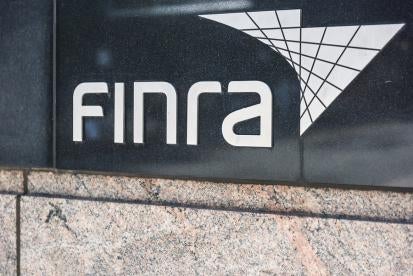FINRA Modifies TRACE Dissemination Protocols for Specified Pool Transactions
On February 2, the Financial Industry Regulatory Authority (FINRA) issued a regulatory notice (Regulatory Notice 21-02) on modifications to its Trade Reporting and Compliance Engine (TRACE) dissemination protocols applicable to agency pass-through mortgage-backed securities and Small Business Administration (SBA)-backed asset-backed securities traded in specified pool transactions.
FINRA disseminates a Reference Data Identifier (RDID) for specified pool transactions. The RDID represents approximated values for underlying data elements, such as the original loan-to-value (LTV) ratio, original maturity and coupon, widely used to project cash flows and prepayment rates.
Beginning on May 17, FINRA is modifying the convention for rounding one underlying data element, the original LTV ratio, for purposes of the groupings that are represented by the RDIDs disseminated through TRACE for specified pool transactions.
LTV ratios will be segmented into eight categories between zero and 121+, and FINRA will show the LTV as the upper limit of the applicable category, as follows:
-
for an LTV up to 20 percent, the LTV will be shown as 20 percent (e.g., an LTV of 12 percent will be shown as 20 percent);
-
for an LTV between 21 percent and 40 percent, the LTV will be shown as 40 percent (e.g., an LTV of 21 percent will be shown as 40 percent);
-
for an LTV between 41 percent and 60 percent, the LTV will be shown as 60 percent (e.g., an LTV of 60 percent will be shown as 60 percent);
-
for an LTV between 61 percent and 80 percent, the LTV will be shown as 80 percent (e.g., an LTV of 70 percent will be shown as 80 percent);
-
for an LTV between 81 percent and 93 percent, the LTV will be shown as 93 percent (e.g., an LTV of 90 percent will be shown as 93 percent);
-
for an LTV between 94 percent and 100 percent, the LTV will be shown as 100 percent (e.g., an LTV of 100 percent will be shown as 100 percent);
-
for an LTV between 101 percent and 120 percent, the LTV will be shown as 120 percent (e.g., an LTV of 105 percent will be shown as 120 percent); and
-
for an LTV of 121 percent or greater, the LTV will be shown as 121+ (e.g., an LTV of 125 percent will be shown as 121+).
The amendment will become effective on May 17.
FINRA Proposes Amendments to Private Placement Filer Form
On January 27, FINRA proposed amendments to its Private Placement Filer Form (Filer Form), which members are required to complete upon submission of private placement filings under FINRA Rules 5122 and 5123.
The Filer Form has three main components: (1) the “Participating Member Information” section, which seeks information about the members that are selling the private placement; (2) the “Issuer Information” section, which captures basic information about the issuer; and (3) the “Offering Information” section, which seeks information about the offering. The proposed changes to the Filer Form would add or clarify questions or other information requested in the Offering Information and Issuer Information sections to address three key categories of offering information: (1) contingency offerings; (2) the disciplinary history of the issuer, its principals and related parties; and (3) the use of proceeds. The proposed changes would be as follows:
-
Contingency Offerings – The proposed changes to the Filer Form would add three additional questions if the offering is a contingency: (1) a request for the member to provide the date by which the contingency must be met; (2) a question asking if there have been any changes to the original terms of the contingency during the course of the offering (e.g., extension of the date by which the contingency must be met); and (3) a question regarding whether “the subscription process involves your firm receiving or transmitting investor funds in the offering.”
-
Disciplinary History – The proposed changes to the Filer Form would add three additional questions if the issuer has disciplinary history: (1) the type of action or proceeding; (2) the approximate year that the event was initiated; and (3) the status of the event.
-
Use of Proceeds – Additionally, the proposed changes to the Filer Form would reformulate the current question for use of proceeds by asking whether the issuer “intends to” use (rather than is “able to” use) offering proceeds to make or repay loans to, or purchase assets from, the listed persons.
FINRA also proposes to add a new question on whether the filing is subject to FINRA Rule 3280 for private securities transactions of an associated person. In addition, FINRA proposes updates to existing questions regarding a member’s date of first sale or offer, the Securities Act registration exemptions that apply, and what type of documents are being filed with FINRA.
Comments on the proposed amendments must be submitted within 21 days following their publication in the Federal Register.
The full text of the proposed amendments.
FINRA New Rule 3241 Becomes Effective February 15
On February 15, Financial Industry Regulatory Authority (FINRA) new Rule 3241 — “Registered Person Being Named a Customer’s Beneficiary or Holding a Position of Trust for a Customer” — becomes effective. The new rule limits any associated person of a member firm who is registered with FINRA (each a “registered person”) from being named a beneficiary, executor or trustee, or to have a power of attorney or similar position of trust for or on behalf of a customer.
Under Rule 3241, all member firms must affirmatively address registered persons being named beneficiaries or holding positions of trusts for customers. The rule requires the member firm with which the registered person is associated, upon receiving required written notice from the registered person, to review and approve or disapprove the registered person assuming such status or acting in such capacity. The rule does not apply where the customer is a member of the registered person’s “immediate family.”
Rule 3241 provides that a registered person must decline:
-
being named a beneficiary of a customer’s estate or receiving a bequest from a customer’s estate upon learning of such status, unless the registered person provides written notice upon learning of such status and receives written approval from the member firm prior to being named a beneficiary of a customer’s estate or receiving a bequest from a customer’s estate; and
-
being named as an executor or trustee or holding a power of attorney or similar position for or on behalf of a customer unless:
-
upon learning of such status, the registered person provides written notice and receives written approval from the member firm prior to acting in such capacity or receiving any fees, assets or other benefit in relation to acting in such capacity; and
-
the registered person does not derive financial gain from acting in such capacity other than from fees or other charges that are reasonable and customary for acting in such capacity.
FINRA notes that to provide flexibility to member firms, Rule 3241 does not prescribe any specific form of written notice and instead permits a member firm to specify the required form of written notice for its registered persons. A member firm must (1) perform a reasonable assessment of the risks created by the registered person’s assuming such status or acting in such capacity, including, but not limited to, an evaluation of whether it will interfere with or otherwise compromise the registered person’s responsibilities to the customer; and (2) make a reasonable determination of whether to approve the registered person’s assuming such status or acting in such capacity, to approve it subject to specific conditions or limitations, or to disapprove it.
The rule also does not affect the applicability of other rules (e.g., FINRA Rule 2150 regarding improper use of customer securities or funds). FINRA notes that a registered person being named as a beneficiary or to a position of trust without his or her knowledge would not violate the rule; however, the registered person must act consistent with the rule upon learning that he or she was named as a beneficiary or to a position of trust.




 i
i


